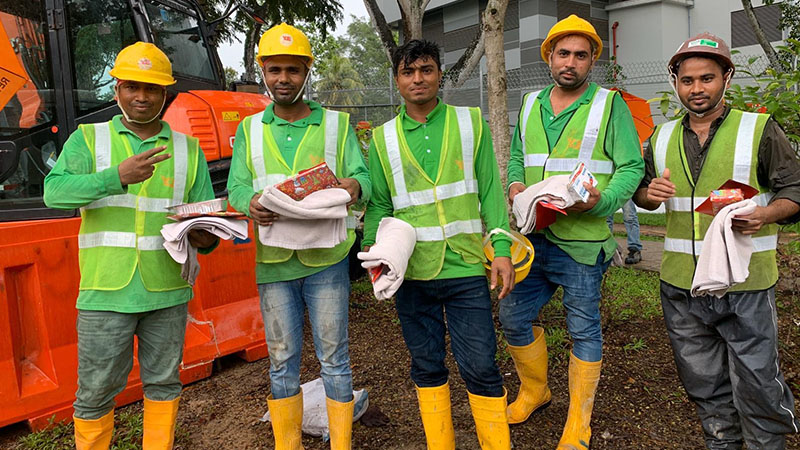Want to know how to help Singapore’s migrant workers through the COVID-19 crisis? Here we meet DIPA SWAMINATHAN, the Singaporean woman behind one organisation that’s been supporting migrant workers for years – even more so now in this crisis – and we learn what we can do to pitch in too. There’s still a lot to be done after the Circuit Breaker period as nearly one in five people living in Singapore is a migrant worker, and more than 300,000 of them are living in dorms.

Tell us about the organisation you founded.
It’s Raining Raincoats started in 2015. I was doing bits here and there on my own to support the migrant workers. A Facebook post in a now-defunct group went a bit viral and the Singaporean Kindness Movement encouraged me to create an official organisation to support migrant workers.
At the time, my suggestion was to carry around disposable raincoats and give them to migrant workers as they’re often caught in the rain without one. When the government asked me for a name, I came up with It’s Raining Raincoats. Now, we do a lot more than just raincoats.
What’s the mission of the organisation?
It’s a simple mission: support migrant workers. We try to do whatever it takes to do that, short of legal representation. No worker who comes to us in need goes away without help. We’ve been successful because we’ve come up with fairly simple, innovative and imaginative ways residents can reach out to migrant workers in need.
You have a big job as the Assistant General Counsel at Singtel.How do you have time to do this too?
I’m hooked. I get such satisfaction when we get these heart-warming messages from the migrant workers saying things such as, “Thank you. I was so hungry. Your gift meant a lot. God bless you.” It’s an empowering feeling knowing I can help somebody. Yes, it takes a lot out of me to do all this, but it also energises me. I wake up every morning buzzing with ideas, limited only by my time to give. It also helps that I have an amazing team supporting me.
How does It’s Raining Raincoats help migrant workers?
In normal times, we run several drives for migrant workers throughout the year. For example, at Deepavali, we do drive-by pizza drop-offs. At Christmas, we make sure every worker gets a gift, even if it’s something small such as Tiger Balm that the worker can use. Each gift is wrapped with a handwritten note. We have 30 to 40 collection points across the country for that. We also run a year-round activity, collecting unsold food from designated Starbucks outlets, four times a week, all year long. That obviously is suspended now, but we always need help with these types of ongoing things and we will continue to need help, long after the crisis has passed.

Do you need volunteers?
We have been very fortunate with lots of people reaching out to help the migrant workers during this crisis. In fact, the number of volunteers has swollen, doubling in size from our normal ranks and we now have about 500 people on our roster. Managing them all becomes a whole separate problem for an all-volunteer group. My hope is that we keep some of these amazing volunteers after the current crisis is over. There will be a lot of clean up from this such as workers not being paid; people too weak to work; breadwinners who no longer have jobs; figuring out where do they go and more. This will not abate soon and our worry is that this crisis will not disappear overnight.
How can somebody help the migrant workers now?
The best way to help just now is for a person to come to us with a fully-formed and executed idea. Once you tell us what you’ve done, we can then help with the last-mile assistance, meaning we can help you get your collection to the workers in need.
For example, you can self-organise a drive in your condo, at your school, within an organisation or amongst friends. Once you have everything collected, we can help get it there. Normally, we accept pre-loved items, but just now, we need to be careful not to inadvertently bring germs to the migrant workers so all items must be new.
If you look on the Facebook page, you can see what’s needed, but items to help pass the time such as games, puzzles and cards, old phones in working condition, data top-up cards, books and magazines in their language, and snacks are always appreciated. It’s better to give smaller amounts in bigger quantities so we can spread the joy. For example, give five $10 data top-up cards rather than one $50 card. The government is providing Wi-Fi for these workers, but there is always more needed.
For more information about It’s Raining Raincoats, check out the Facebook page at fb.com/itsrainingraincoats.
This article first appeared in the June 2020 edition of Expat Living. You can purchase a copy or subscribe so you never miss an issue!





